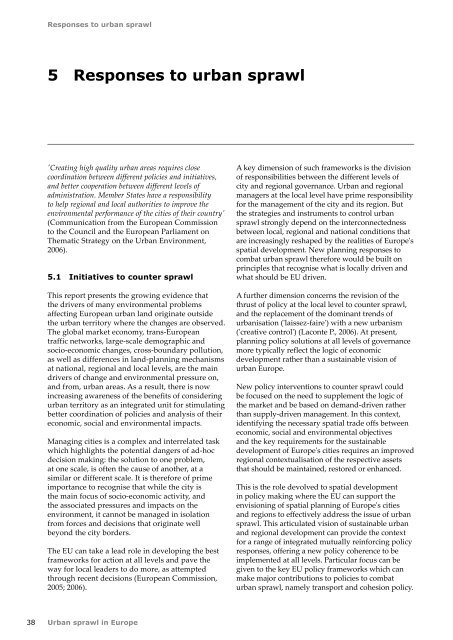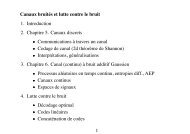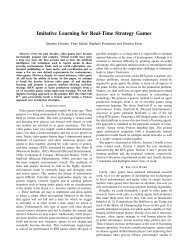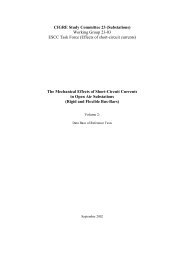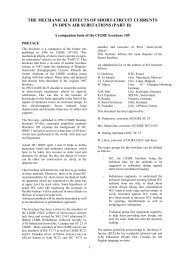Session 1 - Montefiore
Session 1 - Montefiore
Session 1 - Montefiore
Create successful ePaper yourself
Turn your PDF publications into a flip-book with our unique Google optimized e-Paper software.
38<br />
Responses to urban sprawl<br />
5 Responses to urban sprawl<br />
'Creating high quality urban areas requires close<br />
coordination between different policies and initiatives,<br />
and better cooperation between different levels of<br />
administration. Member States have a responsibility<br />
to help regional and local authorities to improve the<br />
environmental performance of the cities of their country'<br />
(Communication from the European Commission<br />
to the Council and the European Parliament on<br />
Thematic Strategy on the Urban Environment,<br />
2006).<br />
5.1 Initiatives to counter sprawl<br />
This report presents the growing evidence that<br />
the drivers of many environmental problems<br />
affecting European urban land originate outside<br />
the urban territory where the changes are observed.<br />
The global market economy, trans-European<br />
traffic networks, large-scale demographic and<br />
socio-economic changes, cross-boundary pollution,<br />
as well as differences in land-planning mechanisms<br />
at national, regional and local levels, are the main<br />
drivers of change and environmental pressure on,<br />
and from, urban areas. As a result, there is now<br />
increasing awareness of the benefits of considering<br />
urban territory as an integrated unit for stimulating<br />
better coordination of policies and analysis of their<br />
economic, social and environmental impacts.<br />
Managing cities is a complex and interrelated task<br />
which highlights the potential dangers of ad-hoc<br />
decision making: the solution to one problem,<br />
at one scale, is often the cause of another, at a<br />
similar or different scale. It is therefore of prime<br />
importance to recognise that while the city is<br />
the main focus of socio-economic activity, and<br />
the associated pressures and impacts on the<br />
environment, it cannot be managed in isolation<br />
from forces and decisions that originate well<br />
beyond the city borders.<br />
The EU can take a lead role in developing the best<br />
frameworks for action at all levels and pave the<br />
way for local leaders to do more, as attempted<br />
through recent decisions (European Commission,<br />
2005; 2006).<br />
Urban sprawl in Europe<br />
A key dimension of such frameworks is the division<br />
of responsibilities between the different levels of<br />
city and regional governance. Urban and regional<br />
managers at the local level have prime responsibility<br />
for the management of the city and its region. But<br />
the strategies and instruments to control urban<br />
sprawl strongly depend on the interconnectedness<br />
between local, regional and national conditions that<br />
are increasingly reshaped by the realities of Europe's<br />
spatial development. New planning responses to<br />
combat urban sprawl therefore would be built on<br />
principles that recognise what is locally driven and<br />
what should be EU driven.<br />
A further dimension concerns the revision of the<br />
thrust of policy at the local level to counter sprawl,<br />
and the replacement of the dominant trends of<br />
urbanisation ('laissez-faire') with a new urbanism<br />
('creative control') (Laconte P., 2006). At present,<br />
planning policy solutions at all levels of governance<br />
more typically reflect the logic of economic<br />
development rather than a sustainable vision of<br />
urban Europe.<br />
New policy interventions to counter sprawl could<br />
be focused on the need to supplement the logic of<br />
the market and be based on demand-driven rather<br />
than supply-driven management. In this context,<br />
identifying the necessary spatial trade offs between<br />
economic, social and environmental objectives<br />
and the key requirements for the sustainable<br />
development of Europe's cities requires an improved<br />
regional contextualisation of the respective assets<br />
that should be maintained, restored or enhanced.<br />
This is the role devolved to spatial development<br />
in policy making where the EU can support the<br />
envisioning of spatial planning of Europe's cities<br />
and regions to effectively address the issue of urban<br />
sprawl. This articulated vision of sustainable urban<br />
and regional development can provide the context<br />
for a range of integrated mutually reinforcing policy<br />
responses, offering a new policy coherence to be<br />
implemented at all levels. Particular focus can be<br />
given to the key EU policy frameworks which can<br />
make major contributions to policies to combat<br />
urban sprawl, namely transport and cohesion policy.


